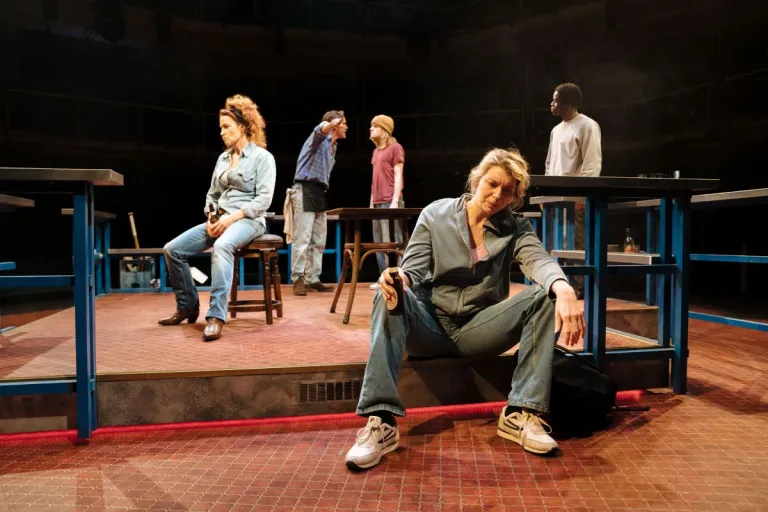ROYAL EXCHANGE THEATRE, MANCHESTER – UNTIL 25 MAY 2024
REVIEWED BY CATHY CRABB
4****
I have not seen anything like Lynn Nottage’s Sweat in a long time. It’s been a minute since I had the privilege of watching something with such a rich mix of intricately knotted strands of narrative themes that leaves me unravelling it all in my mind afterwards.
It’s a complex and suffocating tale told in non- linear form, taking place for the most part in a bar in Reading, Pennsylvania. It starts, however, with two you men Jason (Lewis Gribben) and Chris (Abdul Sessay) just out of jail and on edge. Separate from each other, they are being calmed and grounded by Evan (Aaron Cobham), their parole officer. We know something horrendous has happened but not what.
We then go to the bar in Reading 8 years before and are introduced to an easy, breezy and boozy group of three girlfriends on a night out after the factory. Oscar (Marcello Cruz), puts the tender into bar tender- quietly cleaning and being polite even when he is practically invisible. Stan (Jonathan Kerrigan), the bar manager, is a philosophical soothsayer that sees all sides.
We see that Tracey (Pooky Quesnel), is the mother superior of the girls, kind, fair and welcoming- but firey too with an edge pointed towards Oscar. This seems to show that an underlying bigotry. The kind of bigotry you receive when you move to a small town, from the resident whose family have lived in place since the dawn of time. But you get the feeling that takes people under her wing and assume that will happen. The other two women at this stage are nothing but archetypes of 30-40 something factory girls. Jessie (Kate Kennedy) likes to get leathered and Cynthia (Carla Henry) is trying to move on from her dead beat fella Brucie (Chris Jack), who stole her tropical fish- tank and all. And the two teenage kids Jason, the son of Tracey and Chris, the sun of Cynthia are giddy, if this will break up their friendship. When Cynthia gets promoted during a strike at their factory some cracks begin to show in this merry band. Everything is under the surface, waiting to erupt and you can trust the political climate and the end of mass manual labour to drive a spanner through the soldering.
The bar was a solace, it was a place to let loose. But it becomes the setting for the rusting of the rivets of friendship and a coming-of-age story no one wants to tell. It is so complex and layered that I could watch it every night until it finishes and be engaged in a different character’s trajectory.
It’s a very sad conclusion, it’s moving and true and recognisable and frustrating. But there is a jewel that has always been there and that is the change that graciousness and understanding brings. When the picket lines no longer hold, and the workers lose their grip, could we, for once see the that the person really driving the machines is never accountable. I hope so, says the play.
Stand out performances by everyone.

